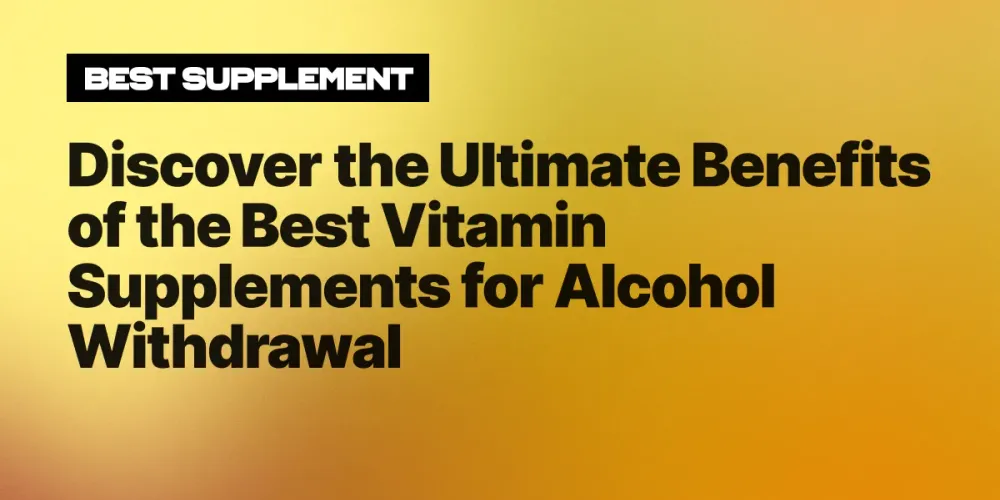Discover the Ultimate Benefits of the Best Vitamin Supplements for Alcohol Withdrawal
- July 12, 2023

Vitamin supplements are essential for individuals going through alcohol withdrawal, as they offer numerous benefits to support the recovery process. In this article, we will delve into the significance of these supplements, the challenges and risks associated with alcohol withdrawal, and how incorporating the best vitamin supplements can help overcome these hurdles. By the end of this section, you will understand why vitamin supplements are crucial during alcohol withdrawal and how they can contribute to a healthier and more vibrant life.
Key Takeaways
- Vitamin supplements are crucial for individuals undergoing alcohol withdrawal as they provide support and aid in the recovery process.
- Proper nutrition is vital during alcohol withdrawal, and vitamin supplements play a key role in ensuring the body receives the necessary nutrients.
- Understanding alcohol withdrawal syndrome (AWS) and the symptoms associated with it is crucial in recognizing the importance of vitamin supplementation.
- Replenishing nutrient deficiencies caused by alcoholism through supplementation is of utmost importance for effective recovery.
- The article will discuss the best vitamin supplements available for alcohol withdrawal, their benefits, and scientific research to support their effectiveness.
- Instructions for supplement usage, including dosage recommendations and precautions, will be provided to ensure safe and effective consumption.
- Potential risks and side effects of vitamin supplements will be addressed, along with ways to minimize these risks and the importance of consulting a healthcare professional.
- The key takeaways will provide readers with a comprehensive understanding of the benefits of vitamin supplements for alcohol withdrawal, encouraging them to seek professional help and adopt a balanced approach to recovery.
Understanding Alcohol Withdrawal Syndrome (AWS)
Alcohol withdrawal syndrome (AWS) is a collection of symptoms that individuals with alcohol use disorder may experience when they abruptly stop drinking or significantly reduce their alcohol consumption. The severity of AWS can range from mild to life-threatening, with the most severe cases leading to a condition called delirium tremens (DT).
When someone consumes alcohol regularly, their body becomes dependent on it, and their brain chemistry undergoes changes. If they suddenly stop or reduce their alcohol intake, the brain must readjust, resulting in withdrawal symptoms. These symptoms may include:
- Headache
- Sweating
- Agitation
- Hearing strange noises
- Visual disturbances
- Tremors
- Anxiety
- Inability to think clearly or concentrate
- Difficulty adjusting to their surroundings
It’s important to note that in some cases, AWS can progress to delirium tremens, a serious condition that requires immediate medical attention. Delirium tremens can present symptoms such as fever, high blood pressure, excessive sweating, increased heart rate and breathing rate, and feelings of itching or burning.
To manage AWS and ease the discomfort of withdrawal symptoms, medical treatment often involves supportive care. Benzodiazepines, such as lorazepam (Ativan) and alprazolam (Xanax), are commonly used to alleviate AWS symptoms.
It’s worth mentioning that alcohol not only affects the brain and nervous system but also has an impact on digestion and nutrient absorption. Alcohol can decrease the secretion of digestive enzymes in the pancreas and impair nutrient absorption in the stomach and intestines. Additionally, alcohol disrupts the gut microbiome, leading to lower nutrient consumption and potential malnourishment.
The Best Vitamin Supplements for Alcohol Withdrawal
Alcohol withdrawal can deplete essential vitamins and minerals in the body, making it crucial to replenish these nutrients through supplementation. The best vitamin supplements for alcohol withdrawal include:
-
B Vitamins: B vitamins, such as B1, B2, B3, B6, and B12, play a vital role in energy production, blood cell formation, and liver health. They can also help reduce cravings for alcohol and support the detoxification process. Look for B Complex supplements that contain all the B vitamins.
-
Vitamin C: Vitamin C is an antioxidant that supports various biological processes in the body, including enzyme reactions, hormone synthesis, and tissue structure. While official guidelines are lacking, some doctors may recommend vitamin C supplements to address nutrient deficiencies during alcohol withdrawal.
-
Omega-3 Oil: Omega-3 fatty acids have anti-inflammatory properties and can help regulate neurotransmitters in the brain, promoting mental well-being and reducing cravings. Fish oil supplements are a good source of omega-3 fatty acids.
-
L-Glutamine: L-Glutamine is an amino acid that plays a crucial role in brain function and can help reduce alcohol cravings. It also supports liver function and helps repair damage caused by alcohol abuse.
-
L-Tyrosine: L-Tyrosine is another amino acid that aids in the production of dopamine, a neurotransmitter associated with pleasure and reward. By replenishing dopamine levels, L-Tyrosine can help restore brain chemistry and reduce alcohol cravings.
-
DL-Phenylalanine (DLPA): DL-Phenylalanine is an amino acid that helps alleviate withdrawal symptoms, improve mood, and restore proper brain function. It can boost dopamine production and support overall mental well-being during alcohol withdrawal.
When choosing vitamin supplements for alcohol withdrawal, consider multi-nutrient support formulas that combine various vitamins, minerals, and other beneficial compounds. Additionally, incorporating a healthy diet rich in leafy greens, fruits, meat, and eggs can provide a natural source of essential nutrients.
Please note that these supplements should be used as part of a comprehensive alcohol withdrawal and recovery plan. Consult with a healthcare professional before starting any supplementation regimen.
Nutrient Deficiencies and Alcoholism
Alcohol abuse can lead to significant nutrient deficiencies in the body, impairing overall health and well-being. People with alcohol use disorder often prioritize alcohol consumption over proper nutrition, resulting in inadequate intake of essential vitamins and minerals. Additionally, heavy alcohol use can interfere with nutrient absorption, particularly vitamins B1, B12, folic acid, and zinc.
Addressing nutrient deficiencies is crucial for supporting the body’s healing process during alcohol withdrawal. Supplementing with detox and alcohol withdrawal supplements can help replenish the lost nutrients and provide the nutritional support needed for recovery.
Here are some ways to control nutrient deficiency caused by alcohol withdrawal:
-
Supplements for Alcohol Withdrawal: Incorporating detox supplements specifically designed for alcohol withdrawal can help replenish essential vitamins and minerals. These supplements should ideally contain key nutrients such as B vitamins, vitamin C, zinc, and magnesium.
-
Proper Nutrition: Adopting a balanced diet that includes nutrient-dense foods can provide additional support for addressing nutrient deficiencies. Focus on consuming foods rich in vitamins, minerals, protein, and other essential nutrients to support recovery.
It’s important to note that alcohol’s impact on digestion can further exacerbate nutrient deficiencies. Alcohol disrupts the secretion of digestive enzymes in the pancreas and impairs nutrient absorption in the stomach and intestines. This disruption can lead to lower nutrient consumption and malnourishment.
By addressing nutrient deficiencies through supplementation and proper nutrition, individuals can support their body’s healing process during alcohol withdrawal and promote overall well-being.
Supplement Usage Instructions
When taking vitamin supplements for alcohol withdrawal, it’s important to follow the recommended usage instructions to ensure optimal effectiveness and safety. Here are some guidelines to consider:
-
Read the label: Carefully read the instructions and dosage recommendations provided on the supplement label. Follow the recommended dosage unless otherwise directed by a healthcare professional.
-
Timing: Take the supplements at the recommended times of the day, as indicated on the label. Some supplements may be best taken with food, while others may be more effective on an empty stomach. Pay attention to any specific instructions regarding timing.
-
Consistency: Be consistent with your supplement routine. Take the supplements consistently every day at the same time to maintain a steady intake of essential nutrients.
-
Precautions: Be aware of any precautions or warnings mentioned on the label. For example, some supplements may interact with certain medications or have specific contraindications.
-
Interactions: If you are taking other medications or have underlying health conditions, consult with a healthcare professional before starting any new supplements. They can provide guidance and ensure that there are no potential interactions or risks.
-
Duration: Follow the recommended duration for taking the supplements. Some supplements may be intended for short-term use during the acute phase of alcohol withdrawal, while others may be suitable for long-term support. If unsure, consult with a healthcare professional.
-
Monitor: Pay attention to your body’s response to the supplements. If you experience any adverse effects or have concerns about their effectiveness, consult with a healthcare professional for further guidance.
Remember, supplements should be used as part of a comprehensive approach to alcohol withdrawal that includes proper nutrition, hydration, and professional support. They should not replace medical advice or treatment.
Risks and Side Effects of Supplements
While vitamin supplements can provide valuable support during alcohol withdrawal, it’s important to be aware of potential risks and side effects. Here are some considerations to keep in mind:
-
Interaction with Medications: Certain supplements may interact with medications you are taking. It’s important to consult with a healthcare professional before starting any new supplements to ensure they do not interfere with your current medication regimen.
-
Allergic Reactions: Some individuals may be allergic to certain vitamins or ingredients in supplements. If you experience any symptoms of an allergic reaction, such as rash, swelling, or difficulty breathing, discontinue use immediately and seek medical attention.
-
Digestive Disturbances: In some cases, vitamin supplements may cause digestive issues such as nausea, diarrhea, or stomach discomfort. If you experience these symptoms, try taking the supplements with food or reducing the dosage.
-
Overdose Risk: While rare, it’s possible to overdose on certain vitamins if taken in excessive amounts. Always follow the recommended dosage guidelines provided on the supplement label and consult a healthcare professional if you have concerns.
-
Individual Variations: Everyone’s body is unique, and individual responses to supplements may vary. Pay attention to how your body reacts to the supplements and adjust the dosage or seek guidance from a healthcare professional if needed.
Please note that these risks and side effects are general considerations and may not apply to all individuals. It’s important to consult with a healthcare professional for personalized advice based on your specific health needs and circumstances.
Conclusion
In conclusion, incorporating the best vitamin supplements for alcohol withdrawal into your recovery plan can provide numerous benefits and support your overall well-being. These supplements play a crucial role in replenishing essential nutrients that may be depleted during alcohol withdrawal, promoting physical and mental recovery.
By taking the recommended vitamin supplements, you can alleviate withdrawal symptoms, reduce cravings, support liver function, and improve overall health. However, it’s important to remember that supplements should be used as part of a comprehensive approach to alcohol withdrawal, which includes proper nutrition, hydration, and professional support.
Additionally, it’s crucial to consult with a healthcare professional before starting any new supplements, especially if you have underlying health conditions or are taking medications. They can provide personalized guidance and ensure that the supplements are safe and suitable for your individual needs.
Remember, alcohol withdrawal can be a challenging process, but with the right support and resources, you can successfully navigate it and embark on a path towards a healthier and more fulfilling life. Take the necessary steps, seek professional help if needed, and prioritize self-care as you embark on your journey of recovery.
Frequently Asked Questions
Q: Can I stop drinking by myself?
A: It is not uncommon for people to attempt to quit drinking on their own, but the majority of individuals who try to quit without professional help often relapse. Seeking the support of a professional treatment program or support group can greatly increase your chances of successful recovery.
Q: What are the first signs of liver damage from alcohol?
A: Signs of liver damage from alcohol can include fatigue, swelling or pain in the upper right abdomen, nausea or vomiting, loss of appetite, and yellowing of the eyes and fingernails. It’s important to seek medical attention if you suspect liver damage from alcohol.
Q: What supplements are good for recovering alcoholics?
A: There are several supplements that may be beneficial for recovering alcoholics, including B vitamins, vitamin C, omega-3 fatty acids, L-glutamine, L-tyrosine, and DL-phenylalanine. However, it’s important to consult with a healthcare professional before starting any new supplements to ensure they are appropriate for your specific needs.
Q: Is there a supplement to stop drinking?
A: While there is no single supplement that can completely stop someone from drinking, certain supplements may help reduce alcohol cravings and support the recovery process. These supplements should be used as part of a comprehensive approach to recovery, which may include professional treatment, therapy, and lifestyle changes.
Q: What is the best multivitamin for alcoholics?
A: There is no one-size-fits-all answer to this question, as individual nutrient needs can vary. It’s generally recommended to choose a high-quality multivitamin that contains a balanced blend of essential vitamins and minerals. Consulting with a healthcare professional can help determine the best multivitamin for your specific needs.
Q: Does alcohol deplete vitamins and minerals?
A: Yes, alcohol can interfere with the body’s ability to absorb and utilize certain vitamins and minerals, leading to nutrient deficiencies. It’s important to address these deficiencies through supplementation and a balanced diet to support overall health and recovery.


